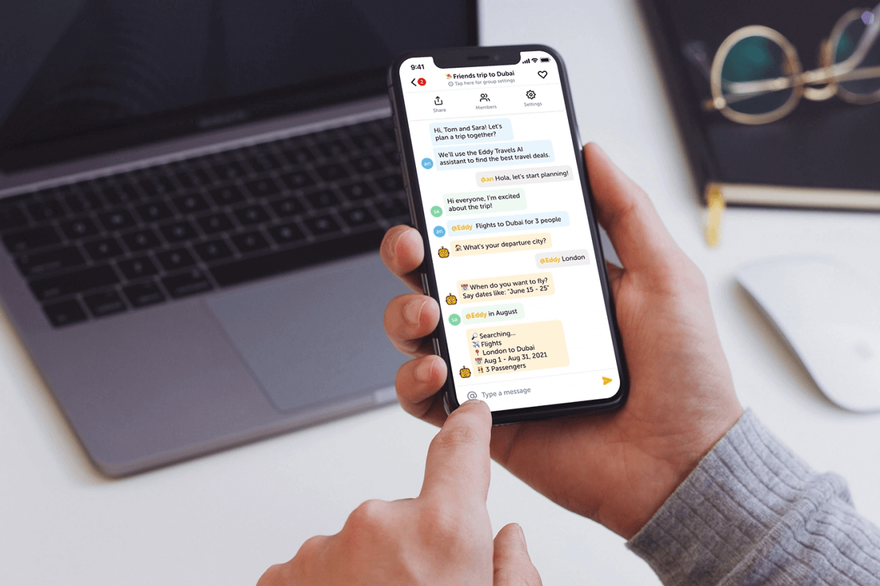artificial-intelligence-in-tourism-and-travel
benefits-of-the-use-of-machine-learning-and-ai-in-the-travel-industry
applications-of-ai-in-the-travel-and-tourism-industry
how-can-the-travel-industry-leverage-ai
How is AI changing the travel industry?
Before the AI revolution, traveling was a chore. This was before Booking.com could recommend cheap flights to your target destinations, before Airbnb could better assist your accommodation based on previous trips, and before fellow tourists could tell you about destinations on Tripadvisor.
Back then, you had to spend time outlining your itinerary, searching for flights, and sorting through several filters to find that one hotel.
But AI has changed all that in the following ways:
AI travel assistants
When planning your trip, an AI assistant can help you do everything, from booking your hotel to adding the dates to your calendar. Think of an AI travel assistant as a travel agent, but without an actual human on the other end.
Advanced personalization
With the help of data science and machine learning, travelers can get recommendations tailored to their needs. Let’s say you searched for “hotels in Madrid” — the results you’ll see the next time you open the app or website will center around accommodations in the Madrid metropolitan area.
Robots for face-to-face customer services
Hotels, travel agencies, and airlines now use chatbots to improve customer services. Travelers also use these chatbots more frequently, especially following the COVID-19 pandemic.
The crown jewel of these AI-powered chatbots is that they can offer answers to frequently asked questions through automated responses.
AI-driven applications for flight forecasting
The FAA uses advanced AI and data science algorithms to predict the demand for flights. These predictions rely on analytics from statistical models that explain and incorporate emerging trends from the different segments of the travel industry.
Data analysis
Since AI works in tandem with data science and machine learning, it gives companies access to massive swathes of data. Using data automation tools, companies can develop descriptive, predictive, and prescriptive models to guide their decision-making processes.
Ready to start implementing AI solutions? Our developers can help you get started.
Benefits of AI in the travel industry
Now that we understand what AI and the travel industry entail, let’s explore how it is valuable to consumers, retailers, and intermediaries.
Offers a better customer experience
Customer satisfaction is vital in the travel industry because your brand’s reputation and success depend on it. Here are the ways AI can improve the customer experience.
Personalization. The use of smart recommendations affects the user experience by reducing the steps needed to complete any action. Once the AI knows a few things about you, it can make recommendations based on your tastes.
Dynamic pricing. Due to instability in the current market, users need to know the price of goods in real-time. AI-powered inventory tools can update the cost of your services with little supervision, helping the customer get the best available personal and corporate travel deals at all times.
Sentiment analysis. AI and ML algorithms can aggregate data to detect consumer sentiment toward your brand. With over 50% of consumers willing to call out a company online, you can easily track your brand satisfaction score online. (More on this later).
Hospitality. Travel and artificial intelligence merge perfectly: AI optimizes every aspect of travel, and as such, improves the hospitality score.
Customer support. Since over 96% of customers say that the level of customer service impacts their relationship with a company, you need to invest in AI-enabled chatbots that use NLP algorithms to humanize automated responses.
Simplifies baggage handling
AI tools like BagsID use biometric data to track, trace, and handle operations associated with baggage handling. Together with rapid computer vision, the AI can recognize and track luggage during a journey, thereby reducing human error.
Helps brands stay relevant
Staying relevant in the social media era involves maintaining an impeccable brand identity.
Let’s jump back to the sentiment analysis discussed earlier: Keeping an eye on consumer satisfaction data — like net promoter score (NPS) — lets you know what they feel about your brand. But AI sentiment analysis tools like Brand24 take this up a few notches by analyzing your social media score.


Top comments (0)